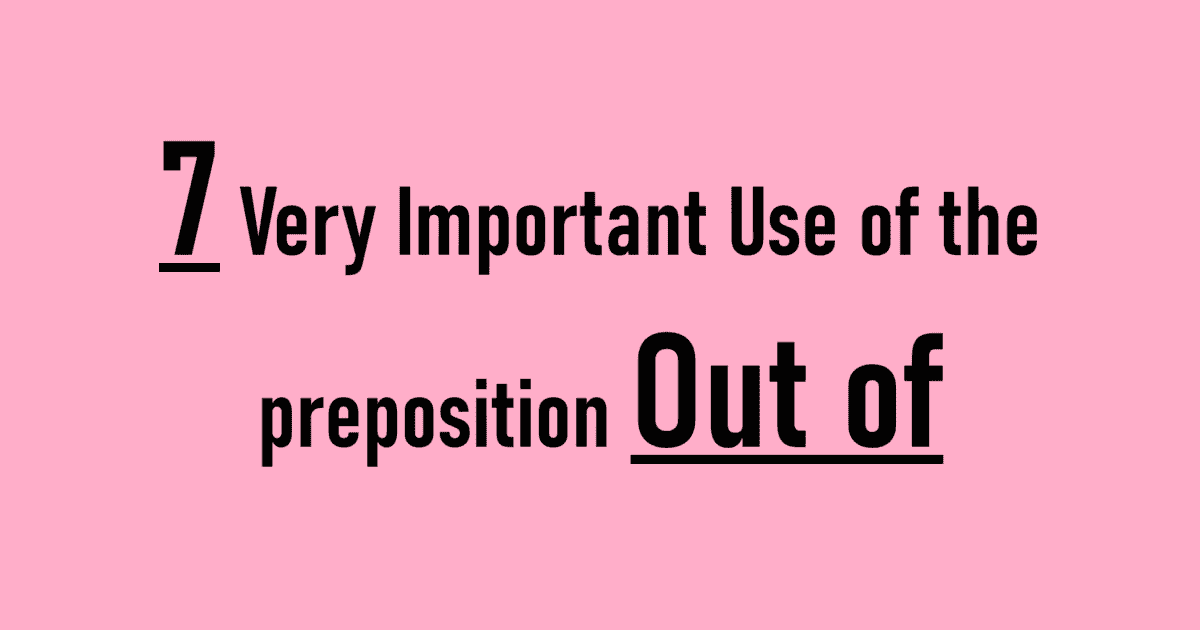Use of the preposition Out of. The preposition “out of” might seem simple on the surface, but like many seemingly straightforward elements of English grammar, it’s packed with nuances. From expressing physical movement to indicating origin and lack of something, “out of” serves a wide range of functions. Understanding these functions will not only improve your writing clarity but also help you interpret the meaning of sentences more accurately. This comprehensive guide will delve into the various uses of “out of,” providing examples and explanations to help you master this versatile preposition.
Use of the preposition Out of
1. Physical Movement: Emerging from Enclosure
The most basic and intuitive use of “out of” describes the action of moving from inside an enclosed space to the exterior. This implies a transition from being contained or covered to being free and exposed.
- Example:The cat jumped out of the box.
- Here, “out of” indicates the cat’s movement from within the box to the space outside.
- Example:He walked out of the room, slamming the door behind him.
- “Out of” shows the subject’s departure from the enclosed space of the room.
- Example:We finally drove out of the tunnel and into the sunlight.
- This example emphasizes the change in environment as a result of exiting the tunnel.
This usage often involves verbs of motion like “jump,” “walk,” “drive,” “climb,” “crawl,” and “run.” It creates a strong sense of spatial transition.
2. Origin and Source: Where Something Comes From
“Out of” can also indicate the origin or source of something, either in a literal or figurative sense.
- Literal Origin:The statue was carved out of a single block of marble.
- Here, “out of” identifies the marble as the material from which the statue was created.
- Example:The river flows out of the mountains.
- This shows the geographical source of the river.
- Figurative Origin:His success grew out of years of hard work and dedication.
- In this case, “out of” denotes the effort and commitment that led to his success, representing the source of that achievement.
- Example:Their disagreement stemmed out of a misunderstanding.
- The misunderstanding is the root cause, the origin, of the disagreement.
This usage highlights the connection between a product or outcome and its initial source.
3. Lack or Depletion: Being Without Something
“Out of” is frequently used to express the absence or depletion of something, indicating a state of lacking or being completely used up.
- Example:We are out of milk.
- This means there is no milk remaining.
- Example:The printer is out of ink.
- The printer cannot function properly because its ink supply is exhausted.
- Example:He ran out of time to finish the exam.
- This describes the depletion of a finite resource, in this case, time.
- Example: She acted out of desperation. (Here, desperation can be interpreted as a “lack of hope”).
This usage is often paired with nouns representing resources, supplies, or abstract concepts like time, money, or patience. It conveys a sense of deficiency.
4. Motivation and Reason: Acting Based On Something
“Out of” can express the motivation or reason behind an action, indicating the feeling or principle that drives someone’s behavior.
- Example:He helped her out of pity.
- His motivation for helping was the feeling of pity.
- Example:She resigned out of principle.
- Her resignation was driven by her strong belief in a particular principle.
- Example:They stayed out of fear of reprisal.
- Their decision to stay was motivated by fear.
- Example: He spoke out of turn. (Here, “out of turn” implies acting without the proper authorization or understanding the rules).
In these cases, “out of” identifies the internal state or external factor that influences a person’s actions.
5. Selection and Grouping: Choosing from Within
While less common than other uses, “out of” can also indicate the selection of an individual or item from a larger group.
- Example:She was chosen out of hundreds of applicants.
- This means she was selected from a group of hundreds of people.
- Example:He picked a card out of the deck.
- This describes the act of selecting a single card from the entire deck.
In this context, “out of” emphasizes the process of choosing or extracting something from a larger collection.
6. Transformation and Creation: Changing Something
“Out of” can sometimes indicate a transformation, where something is made or created from something else. This is closely related to the origin usage but emphasizes the resulting change more.
- Example:They made a fortune out of their invention.
- The invention was the starting point, which then led to the creation of a fortune.
- Example:He built a career out of writing software.
- Writing software was the foundation from which his career was built.
This usage suggests a significant alteration or development resulting from an initial material or activity.
7. Idiomatic Expressions with “Out Of”
“Out of” appears in numerous idiomatic expressions, where the combined meaning is different from the literal meaning of the individual words. Here are a few common examples:
- Out of the blue: Unexpectedly; without warning. (Example: The offer came out of the blue.)
- Out of order: Not functioning properly; broken. (Example: The elevator is out of order.)
- Out of sight, out of mind: If something is not visible, it is easily forgotten. (Example: She moved to a new city, and it was soon out of sight, out of mind.)
- Out of touch: Not aware of current trends or events; lacking connection. (Example: He’s been out of touch with technology for years.)
- Out of breath: Gasping for air; breathless. (Example: He was out of breath after climbing the stairs.)
- Out of the woods: Past a difficult or dangerous situation. (Example: The company is not completely out of the woods yet, but they are making progress.)
Understanding these idioms is crucial for comprehending the intended meaning in various contexts. It’s recommended to look up any unfamiliar idioms to ensure accurate interpretation.
Common Mistakes to Avoid:
- Confusing “Out of” with “From”: While both prepositions can indicate origin, “out of” typically implies a more direct or material source. “From” is often used for less tangible sources or starting points. For example, “He learned the news from the newspaper” is more appropriate than “He learned the news out of the newspaper.”
- Using “Out of” when “Off” is More Suitable: When describing removing something from a surface, “off” is usually the correct choice. For example, “He took the book off the shelf” is preferred over “He took the book out of the shelf” (unless the shelf is enclosed, like a cabinet).
- Overusing “Out of” in Formal Writing: While “out of” is perfectly acceptable in many situations, it can sometimes sound less formal than alternatives like “due to,” “because of,” or “resulting from” in more formal or academic writing.
Conclusion:
“Out of” is a multifaceted preposition with a wide range of applications. By understanding its various functions, from expressing physical movement to indicating origin, lack, motivation, and selection, you can significantly improve your understanding of English and your ability to use the language effectively. Pay attention to the context in which “out of” is used to determine its precise meaning, and be mindful of common mistakes to avoid ambiguity. Mastering this seemingly simple preposition will contribute to clearer, more precise, and ultimately more impactful communication. Keep practicing, and soon you’ll be navigating the nuances of “out of” with confidence!
Read Also,
- Learn all prepositions
- Use of the preposition above
- Use of the preposition about
- What is Religion
- News in Hindi
- Human vs AI
- Very Important Word Lists
>>> Sir Sahil

